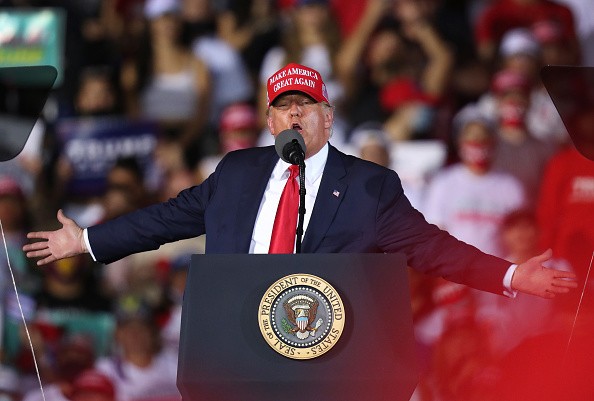Can Trump Win Through Legal Challenge of Election Verdict?

When major America news media called the election for Democrat Joe Biden, President Donald Trump rejected the unofficial results and said he could prove in court that he won.
"The simple fact is this election is far from over," Trump said in a statement, reiterating his stance that legal votes decide who gets to be president, not the media.
Just like Trump, his supporters also refused to accept the media reports.
They blamed major networks for calling the race too soon and still believe there was fraudulent activity that ran rampant in ballot counting.
"I don't think they should call it until all the votes are counted," John Knapek told CNN.
Meanwhile, when 57-year-old Trump supporter Christine Stellabotte heard that the President was pursuing legal battles, she said she welcomed the lawsuits if there is evidence to show.
Since then, law experts have been debating if Trump can indeed win the election legal challenges.
But as The Hill contributor Alan Dershowitz said in his opinion article, the public was instead met by wishful thinking from partisans.
Those who want Trump to win say he'll win in court, but those who want Biden in office tell the legal challenges don't have strong bases.
Several experts believe the latter: that Biden will retain the win projected by the media.
This is because the Trump campaign had not provided evidence of widespread fraud to overturn results in several states.
"Trump's litigation strategy is going nowhere. It is not going to make a difference to the election outcome," UC Irvine election law expert Richard Hasen told NDTV.
Trump Could Win in Pennsylvania
The case filed in Pennsylvania could be a win for Trump, said Dershowitz.
In the suit, the Trump campaign alleged that late-arriving mail-in ballots were illegally counted.
The Supreme Court appeared to be interested in the case after Justice Samuel Alito who oversees the federal circuit ordered all of these ballots to be counted separately, reported USA Today.
Prior to the decision, the state's secretary of state had already ordered the ballots to be kept apart, but the order made it clear that there are some others who may be ready to discount the votes.
It was the Pennsylvania high court that extended the time in receiving and counting mail-in ballots by three days.
It was a sensible decision given the health risks of the coronavirus pandemic.
But according to Trump's lawyers, the state's high court didn't have the authority to change the rules.
Pennsylvania should have only received mail-in ballots that were received before the end of the election.
There is a good chance that more partisan current Supreme Court justices will side with Trump on the issue.
But whether a court win would also mean changing the outcome for Pennsylvania remains uncertain.
If the challenged votes are less than the margin by which Biden won, then the legal action would be pointless.
Other Cases More Difficult for Trump
The campaign's other cases in Michigan, Nevada, Arizona, Georgia, and perhaps others will be more challenging than the Pennsylvania case.
Pennsylvania challenges the votes based on a violation of state legislation and is a matter of constitutional law.
Read also: Judges in Michigan and Georgia Reject Trump Lawsuits, Undercutting GOP Campaign's Legal Action
But the other states' cases are based on particular votes, specific practices and local rules.
The campaign will need to present evidence and that evidence can be contested by the other side.
For Trump to change the election verdict, he'll need to prove there are enough invalid votes in enough states to get 270 electoral votes.
Turning one state around won't be enough, even in Pennsylvania. He needs to do it in several states.
Subscribe to Latin Post!
Sign up for our free newsletter for the Latest coverage!
© 2026 Latin Post. All rights reserved. Do not reproduce without permission.












